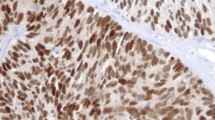Abstract
Background: Numerous problems are associated with biochemical androgen receptor (AR) assay performance and interpretation in prostatic cancer. The purpose of this study was to determine if a novel immunocytochemical AR assay performed on intact tissue sections would prove useful in prognosticating endocrine response and survival.
Methods: A prospective study was done on 63 prostatic carcinomas maintained in liquid nitrogen for over a decade. The study used the peroxidaseantiperoxidase system and a polyclonal anti-AR antibody.
Results: Marked tissue and cellular heterogeneity of nuclear AR was apparent. A cut-off of 10% AR-positive cells maximized assay prognostic efficiency. Frequency of positivity was 48% and correlated significantly with endocrine response (p=0.03), time to progression (p=0.0016), and survival (p=0.02), but not with grade, stage, or ethnicity.
Conclusions: This AR assay could be prognostically useful in the clinical management of prostate cancer and is suitable for use in the community hospital laboratory.
Similar content being viewed by others
References
Coffey DS. Prostate cancer. An overview of an increasing dilemma.Cancer 1993;71(suppl):880–6.
Huggins C, Hodges CF. Studies on prostatic cancer. I. The effect of castration, of estrogen and of androgen injection on serum phosphatases in metastatic carcinoma of the prostate.Cancer Res 1967;27:1925–30.
Walsh PC. Physiologic basis for hormonal therapy in carcinoma of the prostate.Urol Clin North Am 1975;2:125–40.
Pertschuk LP, Rosenthal HE, Macchia RJ, et al. Correlation of histochemical and biochemical analyses of androgen binding in prostatic cancer: relation to therapeutic response.Cancer 1982;149:984–93.
Barrack ER, Tindall DJ. A critical evaluation of the use of androgen receptor assays to predict the androgen responsiveness of prostatic cancer. In:Current concepts and approaches to the study of prostate cancer. New York: Alan R. Liss, 1987:155–87.
Pertschuk LP, Macchia RJ. Histochemical androgen binding assay in prostatic cancer.J Urol 1984;131:1096–8.
Pertschuk LP, Eisenberg KB, Macchia RJ, Feldman JG. Heterogeneity of steroid binding sites in prostatic carcinoma: morphological demonstration and clinical implications.Prostate 1985;6:35–47.
Pertschuk LP, Macchia RJ. Androgen binding in prostatic carcinoma by histochemistry: update 1985.Appl Pathol 1985;3:221–9.
Naito H, Ito H, Wakisaka M, Kambegawa A, Shimazi J. Histochemical observation of R1881 binding protein in human benign prostatic hypertrophy.Invest Urol 1981;18:337–40.
Matsumura T, Naito H, Yamaguchi K, et al. Histochemical observation of R1881 binding protein in human prostatic cancer.Urol Int 1983;38:25–8.
Umehara T, Takagi Y, Kumamoto Y. Functional steroid receptors in prostatic carcinoma. A comparison between viable cell assay and fluorescent staining method [abstract in English].Jpn J Urol 1988;79:1937–46.
Yamaguchi K, Sumiya H, Fuse H, et al. Androphilic protein studied histochemically in stage D2 prostatic cancer.Cancer 1980;61:1425–9.
Lammel A, Krieg M, Klotzi G. Are fluorescein-conjugated androgens appropriate for a histochemical detection of prostatic androgen receptor?Prostate 1982;4:271–82.
Harper ME, Morton MS, Sibley PEC. Studies of fluorescent-labelled steroids in prostate tissue.Prostate 1983;4:420.
Greene GL, Fitch FW, Jensen EV. Monoclonal antibodies to estrophilin. Probes for the study of estrogen receptors.Proc Natl Acad Sci USA 1980;77:157–61.
Greene GL, Nolan C, Engler P, Jensen EV. Monoclonal antibodies to human estrogen receptor.Proc Natl Acad Sci USA 1980;77:5115–9.
Pertschuk LP.Immunocytochemistry for steroid receptors. Boca Raton, FL: CRC Press, 1990.
Prins G, Birch L, Greene GL. Androgen receptor localization in different cell types of the adult rat prostate.Endocrinology 1991;129:3187–99.
Schmidt JD, Johnson DE, Scott WW, et al. Chemotherapy of advanced prostatic cancer, evaluation of response parameters.Urology 1976;7:602–10.
Pertschuk LP, Kim DS, Nayer K, et al. Immunocytochemical estrogen and progestin receptor assays in breast cancer with monoclonal antibodies. Histopathologic, demographic, and biochemical correlations and relationship to endocrine response and survival.Cancer 1990;66:1663–70.
Cox D. The contribution of statistical methods to cancer research. In:Accomplishments in cancer research. Philadelphia, PA: JB Lippincott, 1990:81–5.
Cox DR, Oakes D.Analysis of survival data. Chapter 7. London: Chapman & Hall, 1984:91–110.
Mehta CR, Patel NR, Tsiatis AA. Exact significance testing to establish treatment equivalence for ordered categorical data.Biometrics 1984;40:819–25.
Sadi MV, Walsh PC, Barrack ER. Immunohistochemical study of androgen receptors in metastatic prostate cancer. Comparison of receptor content and response to hormonal therapy.Cancer 1991;67:3057–64.
Ishikawa S, Soloway MS, Van der Zwaag R, Todd B. Prognostic factors in survival free of progression after androgen deprivation therapy for treatment of prostate cancer.J Urol 1989;141:1139–42.
Smith JA Jr., Middleton RG.Clinical management of prostatic cancer. Chicago, IL: Year Book Medical, 1987:134–61.
van Aubel O, Bolt-de-Vries J, Blankenstein MA, Schroder FH. Prediction of time to progression after orchiectomy by the nuclear androgen receptor content from multiple biopsy specimens in patients with advanced prostate cancer.Prostate 1988;12:191–8.
Takeda H, Nakamoto T, Kokontis J, et al. Autoregulation of androgen receptor expression in rodent prostate: immunohistochemical and in situ analysis.Biochem Biophys Res Commun 1991;177:488–96.
Quarmby VE, Beckman WC Jr., Cooke DB, et al. Expression and localization of androgen receptor in the R-3327 Dunning rat prostatic adenocarcinoma.Cancer Res 1990;50:735–9.
Ruizeveld de Winter JA, Trapman J, Vermey M, et al. Androgen receptor expression in human tissues: an immunohistochemical study.J Histochem Cytochem 1991;39:927–36.
Ruizefeld de Winter JA, Trapman J, Brinkemann AO, et al. Androgen receptor heterogeneity in human prostatic carcinomas visualized by immunohistochemistry.J Pathol 1991;161:329–32.
Sadi MV, Barrack ER. Androgen receptors and growth fraction in metastatic prostate cancer as predictors of time to tumor progression after hormonal therapy. Cancer surveys.Prostate Cancer 1991;11:195–215.
Demura T, Kuzumaki N, Oda A, et al. Establishment of monoclonal antibody to human androgen receptor and its clinical application for prostatic cancers.Am J Clin Oncol 1988;11(suppl 2):23–6.
Brolin J, Skoog L, Ekman P. Immunohistochemistry and biochemistry in detection of androgen, progesterone, and estrogen receptors in benign and malignant prostatic tissue.Prostate 1992;20:281–95.
Yagoda A, Watson RC, Natale RB, et al. A critical analysis of response criteria in patients with prostatic cancer treated with cis-diammine dichloride.Cancer 1979;44:1553–62.
Kinsel LB, Szabo E, Greene GL, et al. Immunocytochemical analyis of estrogen receptors as a predictor of prognosis in breast cancer patients. Comparison with quantitative biochemical methods.Cancer Res 1989;49:1052–6.
Author information
Authors and Affiliations
Rights and permissions
About this article
Cite this article
Pertschuk, L.P., Macchia, R.J., Feldman, J.G. et al. Immunocytochemical assay for androgen receptors in prostate cancer: A prospective study of 63 cases with long-term follow-up. Annals of Surgical Oncology 1, 495–503 (1994). https://doi.org/10.1007/BF02303615
Received:
Accepted:
Issue Date:
DOI: https://doi.org/10.1007/BF02303615




